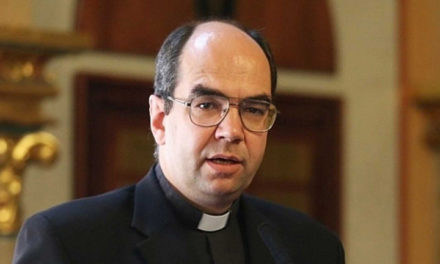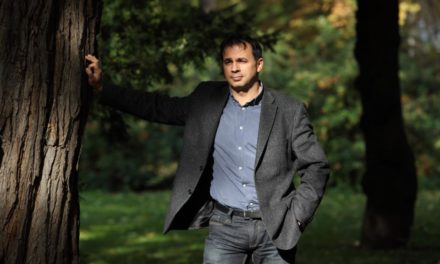Genie-believing superstition? A message about the "universalistic power of love" as stated by Márton Gulyás? Some kind of humanistic philanthropy perhaps? Well, yes: no.
Misconceptions abound: the otherwise well-informed journalist is convinced that the message of Christianity is "the universalistic power of love"; it is an unfathomable scandal for a whole range of intellectuals that, according to its self-definition, the church is not a charitable institution; churchgoers complain that during Advent, the priest talks to them about conversion from the pulpit, while he could otherwise be reciting Coelho's words to them in a soothing way,
if they got up so skillfully and went to church on Sunday.
But the good thing is that on the occasion of Christmas these can be cleaned in a cool way. Rooted misunderstandings may not necessarily lie only in ignorance, but also in the recent perception of Christmas as a Christian holiday par excellence: that is, that in Advent we drink good mulled wine, have fun at company parties and donate from the surplus, then at Christmas for the sake of the atmosphere and the to wind down after many, many festive dishes, we might visit a church where beautiful Christmas carols are played as a kind of spiritual wellness service. That's it.
While there are one or two details that are less obvious, but more instructive: let's look at the beginning of the story, for example.
When a very young, unmarried girl - who not only hasn't gotten drunk at any kind of party, but is a downright virgin - finds out overnight that she's going to have a child, not by the one she's about to marry, and it's all happening in a place and time where that kind of thing petrification is involved, then we can rightly call it a crisis situation. And the wishes contained in the words of the archangel Gabriel are even impossible to fulfill with human reason.
No one could have expected Mária from Nazareth to risk not only her relationship (love is love), but also her physical integrity!
So that from now on he doesn't live the life he so accurately imagined for himself! Moreover, all this was timed so that due to the census, she would have to give birth away from home, in a totally vulnerable position! Right.
However, according to the signs, the Savior can be born just there, the miracle can happen where, even in such a situation, reliance on him succeeds. Where, instead of convulsively chanting slogans like "MY body, MY decision" mechanically taken over from unknown activists, a "Here, I am the Lord's servant" comes out of the mouth. Of course, you can leave out this part of the story, calling meditating on such things embarrassing devotion (in fact, a more easily digestible message is "Here is a nice book, there is a ball, alas, but the Christmas tree is beautiful"), just so we can record that Jesus Christ was born on Earth thanks to saying "let it be done to me according to your word", so that he could fulfill his earthly mission by saying "not my will, but yours be done".
This perhaps makes it easier to understand what the difference is between a church following Christ and a humanistic charity -
I wish the Great Philanthropist would always seek God's kingdom, at least between two short sales.
Another interesting thing is that, while here in recent weeks, crowds have been wondering what some people are looking for in the church even before Christmas, even on weekday mornings ("is it that big of a problem???" - as if this were some kind of jinn-believing superstition circle, where the person is the prayer is only resorted to when absolutely necessary, just like a colonoscopy), in fact the Christmas story consists of nothing more than people going to God's house, or looking up in their homes or in the fields.
Zechariah enters the sanctuary, where the angel speaks to him; When Elizabeth and Mary meet, they do not praise each other's hairstyles, but the Almighty for his mercy; József does not drink himself, but ponders and listens to the divine message with a clear head; the shepherds returning home from Bethlehem glorify God, instead of shooting some kind of contemporary selfies, showing the world where I have been, who I have seen - many more, up to the prophetess Anna, who as an 84-year-old widow fasts and prays day and night, even though she could argue all day long, that it hurts here, it hurts there.
And the strange thing is that none of them seem unhappy and embittered by this attention to the heavens: when the baby mother, who could potentially be stoned at any time, bursts out saying "my heart rejoices in my redeeming God", and when the elderly Simeon, instead of fearing death, calmly says "let me go now , Lord, your servant is at peace according to your words, because my eyes have seen your salvation", then we feel that
the message is not an obscurely esoteric slogan like "the universalistic power of love", but rather that "God is with us" quite specifically.
every day, until the end of the world - just to get a feel for it, it doesn't hurt to pay attention to it and be in constant contact with it, instead of packing it away with the string of lights at the end of the holiday, so that it doesn't disturb you during the year. But, of course, the bagel is just as delicious without thinking about all this, that's not the point - let's just record it before there is another misunderstanding about what a simple Christian needs so many prayers for.
Little St. Theresa is said to have said that "Jesus asks for nothing but trust and gratitude." And if we could regularly rejoice at that time, getting what we wanted from Jesus, then it's pretty funny if, in return, little Jesus waits year after year in vain for him to finally receive his gift. Especially since it doesn't even cost money.
Featured Image: Pixabay













